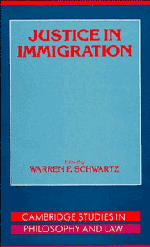Book contents
- Frontmatter
- Contents
- List of contributors
- 1 Immigration, welfare, and justice
- 2 Citizenship, the demands of justice, and the moral relevance of political borders
- 3 A two-country parable
- 4 Immigration, identity, and justice
- 5 Immigration, justice, and culture
- 6 Fear and loathing at the border
- 7 Immigration policy in liberal political theory
- 8 The welfare economics of immigration law: a theoretical survey with an analysis of U.S. policy
- 9 Just borders: normative economics and immigration law
- 10 Some caveats on the welfare economics of immigration law
- 11 The case for a liberal immigration policy
5 - Immigration, justice, and culture
Published online by Cambridge University Press: 18 March 2010
- Frontmatter
- Contents
- List of contributors
- 1 Immigration, welfare, and justice
- 2 Citizenship, the demands of justice, and the moral relevance of political borders
- 3 A two-country parable
- 4 Immigration, identity, and justice
- 5 Immigration, justice, and culture
- 6 Fear and loathing at the border
- 7 Immigration policy in liberal political theory
- 8 The welfare economics of immigration law: a theoretical survey with an analysis of U.S. policy
- 9 Just borders: normative economics and immigration law
- 10 Some caveats on the welfare economics of immigration law
- 11 The case for a liberal immigration policy
Summary
The question of whether an individual has, as a matter of justice, a right to enter, permanently reside in, or become a citizen of a state to which she currently stands as an outsider is unavoidably bound up with questions of whether and to what extent there exist rights in justice to certain kinds of goods. The relationship between borders and goods is complex, but as a first approximation we can distinguish between two categories of goods access to which is affected by restrictions on entry to states. The first consists of land and other natural resources that are located within a state's territory. The second comprises goods that depend for their existence on the activities and ways of life of people living in the state. One good in the second category is the social surplus or national wealth that results from economic activity. Others are various kinds of public goods, that is, goods that are relatively nonrival in consumption and that are not easily subject, as far as the distribution of their benefits is concerned, to centralized control. The existence or at least the general character of some of the public goods in this category is intimately connected with the nature of the legal and political systems in individual states; public security and markets are examples that come to mind. Other public goods, such as the good of cultural community, exist more or less independently of the state but are capable of being protected or nurtured by it.
In Section I of this essay I consider, in a general and schematic way, how a liberal theory of justice should deal with questions of immigration.
- Type
- Chapter
- Information
- Justice in Immigration , pp. 94 - 135Publisher: Cambridge University PressPrint publication year: 1995
- 19
- Cited by

